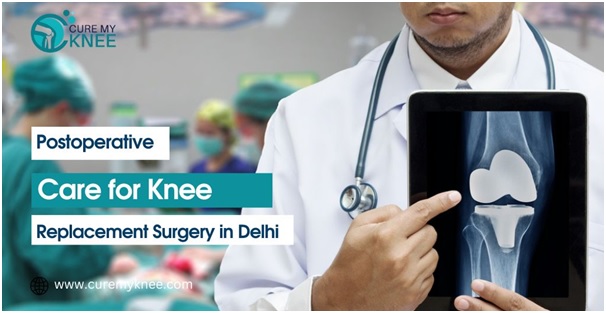A substantial surgical procedure, knee replacement surgery can significantly enhance a patient’s quality of life. To ensure a healthy recovery following surgery, it is crucial to adhere to postoperative care guidelines. We will talk about postoperative care for knee replacement surgery in Delhi in this article.


Recovery Timeline
Each patient’s recovery period following knee replacement surgery is unique, although it usually lasts 6 to 8 weeks. Patients should avoid intense activities like heavy lifting or jogging during this time and concentrate on low-intensity physical therapy and exercise to regain strength and mobility.
Pain Management
Patients who have knee replacement surgery may feel pain and discomfort. Doctors may advise using cold packs and compression wraps in addition to pain medication to treat this discomfort. It is crucial to follow the directions on your prescription and not take more medication than is advised.
Physical Therapy
After a knee replacement operation, physical therapy is a crucial element of the healing process. Together with the patient, a physical therapist will create a personalised rehabilitation programme to increase strength, flexibility, and range of motion. The patient should perform the specified exercises at home and attend all scheduled physical therapy appointments.
Wound Care
After knee replacement surgery, patients will have a dressing on the surgical site. It is essential to keep the dressing clean and dry and to change it as instructed by the doctor or nurse. Patients should also monitor the surgical site for signs of infection, such as redness, swelling, or discharge, and report any concerns to their doctor.
Medication Management
In addition to pain medication, patients may need to take other medications, such as antibiotics or blood thinners, after knee replacement surgery. It is essential to take all medications as prescribed and to report any side effects or concerns to the doctor.
Lifestyle Modifications
To ensure a successful recovery after best knee replacement surgery, patients may need to make certain lifestyle modifications. These modifications may include using assistive devices, such as crutches or a walker, to aid in mobility and avoiding activities that may put stress on the knee joint, such as kneeling or squatting.
Follow-up Appointments
After knee replacement surgery, patients will have several follow-up appointments with their doctor to monitor their recovery and ensure that everything is progressing as expected. It is essential to attend all follow-up appointments and to report any concerns or complications to the doctor.
Rehabilitation
Rehabilitation after knee replacement surgery involves a range of exercises and activities designed to improve strength, flexibility, and mobility in the affected knee joint. The goal of rehabilitation is to help patients regain function and reduce pain and stiffness in the knee joint.
Rehabilitation typically begins within 24 hours of surgery and continues for several weeks or months, depending on the patient’s individual needs. A physical therapist will work with the patient to develop a customized rehabilitation plan, which may include the following:
- Range of motion exercises: These exercises help to improve flexibility in the knee joint and prevent stiffness.
- Strengthening exercises: These exercises help to improve strength in the muscles surrounding the knee joint, which can help to support the joint and reduce pain.
- Weight-bearing exercises: These exercises help to improve balance and stability in the knee joint.
- Gait training: This involves learning how to walk properly, with the aid of assistive devices if necessary.
- Functional activities: These are activities that mimic the patient’s daily life, such as climbing stairs or getting in and out of a car.
Physiotherapy
Physiotherapy is a type of rehabilitation that focuses on physical manipulation and exercise to improve function and reduce pain. Physiotherapy may include the following:
- Manual therapy: This involves hands-on techniques to mobilize and manipulate the soft tissues and joints in the affected knee.
- Exercise therapy: This involves specific exercises designed to improve strength, flexibility, and range of motion in the affected knee joint.
- Electrotherapy: This involves the use of electrical stimulation to reduce pain and improve muscle function in the affected knee joint.
- Heat and cold therapy: This involves the use of heat or cold to reduce pain and inflammation in the affected knee joint.
Benefits of Rehabilitation and Physiotherapy
Rehabilitation and physiotherapy offer a range of benefits for patients undergoing Best Knee Replacement Surgeon in Delhi. These benefits include:
- Improved function and mobility in the affected knee joint
- Lessening of discomfort and stiffness in the knee joint
- Increased strength and flexibility in the muscles surrounding the knee joint
- Improved balance and stability in the knee joint
- Faster recovery time
- Reduced risk of complications, such as blood clots or infections
Conclusion
Postoperative care is essential for a successful recovery after knee replacement surgery. Patients in Delhi should follow the guidelines provided by their doctor, including pain management, physical therapy, wound care, medication management, lifestyle modifications, and follow-up appointments. By following these guidelines, patients can achieve the best possible outcome and enjoy a pain-free, active lifestyle. We at Cure My Knee have highly skilled orthopaedic doctors with us in Delhi. We offer sincere counsel and the most effective course of action that is inexpensive.
















